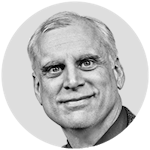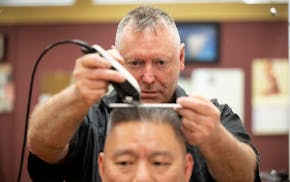Nearly a decade ago, Marine Lance Cpl. Kyle Anderson, a can-do guy out of suburban St. Paul who was a state high school wrestling champion, was decorated for pulling a wounded buddy out of the line of fire in Iraq.
Days later, in October 2004, while on patrol, Anderson was cut down by a roadside bomb that sent pieces of shrapnel through his helmet and into his skull.
Anderson's life was saved by surgeons at Baghdad Hospital.
And that marked the beginning of years of medical work to repair his injured body and brain at the Minneapolis Veterans Affairs Medical Center.
And therapy — physical, occupational and emotional — that continues today to help him recover lost speech, coordination and strength.
This Miracle Marine, who lives independently with the help of family members, two years ago went back to work. Following a successful housekeeping internship at the VA that was part of his therapy, Anderson was hired part-time to stock shelves and manage refrigerated goods by Clay Schultze, store manager at a Walgreens in Inver Grove Heights.
"I'm always busy," Anderson said with a warm grin last week that transcended his speech impediment. "Tuesday is our busiest day. All our vendors show up. I like people. I go home then and rest."
This Labor Day marks five years since the Great Recession. Today, more Minnesotans than ever are working and the economic recovery has gained job-generating traction. Yet one group — people with disabilities, whether acquired through injury or congenital — who want to work have yet to recover from the economic downturn, according to government statistics and advocacy groups.
"About 70 percent of adults with physical or mental disabilities, such as autism or brain damage, are unemployed," said Margaret Li, executive director of Minnesota Business Leadership Network, a coalition of employers that are committed to doing more. "They want to work, but they can't find employers who will hire them. Taxpayers have an interest, too. Because the more people with disabilities who are hired and can support themselves, the less we pay in [Social Security disability income and other public programs]."
Anderson loves to work because of the satisfaction he gets from accomplishing his job, interacting with colleagues and customers, and earning a wage.
"He knew everybody's name the second day he worked," Schultze said. "He's popular, a good worker and a problem solver. He's always showing me ways to reorganize the cooler."
Talking to Anderson, 29, and his colleagues, his VA therapists and his proud father last week called to mind the phrase: "the dignity of work." Anderson, although restricted in strength and able to use only one arm, is the embodiment of pride, determination and goodwill. He's the kind of guy most of us would be proud to call a colleague.
According to the Minnesota Department of Employment and Economic Development earlier this year, about 27 percent of Minnesotans over age 16 with a disability had a job, compared with 22 percent nationally, based on 2012 figures. Meanwhile, the percentage of working-age Minnesotans who work is about 70 percent, three times the employment rate for those with disabilities.
To be sure, some folks with severe physical or mental disabilities don't work. And many others can't find work, say advocates.
The demographic experts and labor economists tell us that, as the baby boomers age and continue to retire in their 60s, our economy eventually will face labor shortages. Increasingly it will be smart business, as well as the right thing to do, to hire those with disabilities.
In August, Gov. Mark Dayton directed state agencies to hire more employees with disabilities, seeking to reverse a decline in the state's hiring of disabled people. Dayton's goal: to increase employment of people with disabilities to 7 percent by 2018, up from 3.2 percent in 2013.
"We think this will make a huge difference at the state level, and hopefully spread to other companies and businesses," said Alan Parnes, a member of the Commission of Deaf, DeafBlind and Hard of Hearing Minnesotans. His is one of about eight state councils and advocacy groups that helped craft the executive order.
Advocates say such initiatives help employers get beyond any "roadblocks" to hiring people with disabilities, including perceived reliability or transportation issues.
"A big piece of it is partnering with nonprofits in the community, such as Goodwill Easter Seals, which trains and places people with disabilities," said Philomena Satre, vice president of diversity and inclusion at Wells Fargo. "Rather than wait for these candidates to apply, we need to get out there and talk to them about the jobs, the career paths and how we will support them, including through our veterans and disabilities networks.'' Satre added that retention rates are higher among the disabled than the general employee population.
"It's kind of like they have overcome so much and they are so appreciative of the opportunity," she said.
Jim Peet, 65, a senior IT business consultant at Wells Fargo, injured himself in a trampoline accident in 1987 and needs crutches to walk.
"I walk like Frankenstein," Peet quipped.
He can't imagine not working and plans to volunteer to stay active after retirement.
"Work is affirming because you've got to get dressed, you work with your work colleagues, some of whom become friends, and you get paid," Peet said. "You don't go stale."
Pete also says he is lucky because he was hired by a supervisor who overlooked his limited IT background "and took a chance on me."
Joey Carlson, 38, is a marketing-communications specialist at U Care who became a quadriplegic at 17 because of a car accident. He also was laid off from a marketing job at Medtronic during the Great Recession.
"It was tough to get laid off, just like every other employee who's been laid off … but I got a new job [in 2012]," Carlson said. "I got an MBA and got a job at U Care where I lead all communications on Medicaid products, such as the website and brochures.''
Carlson said he could live on Social Security disability insurance. "But I've always been a driven person. It's nice to have more income. The real reason I work has more to do with purpose and getting out every day."
Neal St. Anthony • 612-673-7144
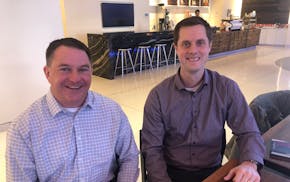
St. Anthony: 'Patient' investing paying off for St. Paul's Hill Capital
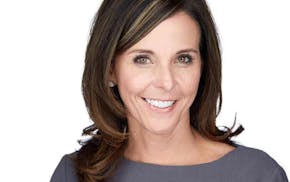
Jennifer Smith, leader of Burnsville's Innovative Office Solutions, has died
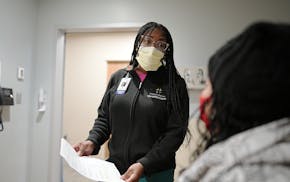
St. Anthony: Medical professions in Minnesota need more people of color in their ranks

